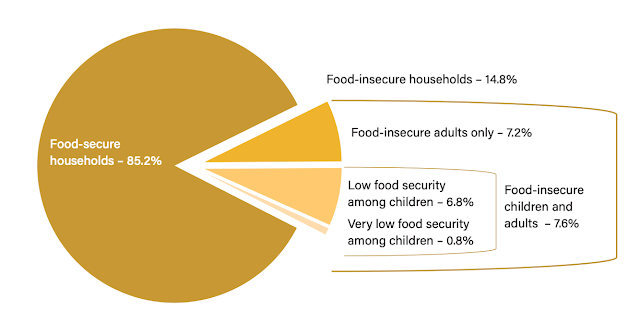 |
| U.S. households with children by food security status of adults and children in 2020. Agriculture Department chart; click the image to enlarge it. |
Hunger in the U.S. decreased slightly from 2019 to 2020, according to a new report on household food security in the U.S. by the Agriculture Department's Economic Research Service. However, more children went hungry, more people used food banks, and overall food insecurity last year was higher than the national average in nine states: Alabama, Kentucky, Louisiana, Mississippi, New Mexico, Oklahoma, Tennessee, Texas and West Virginia.
Among rural households with income below 130% of the poverty line, 69.4% were food secure in 2020, compared to 66.3% in metro areas. In 2019, 64.8% of such homes were food secure, compared to 67.8% in metro areas.
The percentage of poor households with very low food insecurity fell as well: from 14.7% of rural households in 2019 to 12.9% in 2020. Among poor metropolitan households, the percentage fell from 13.9% to 13.1%. Parents usually bear the brunt of hunger in food insecure households, skipping or cutting back on meals. But "very food insecure households" are characterized by children also going hungry sometimes.
The percentage of rural individuals experiencing food insecurity also fell slightly: from 87.5% in 87.3%. Among metro residents, food insecurity fell from 89.4% to 88.4%.
But, the percentage of very food-insecure individuals rose slightly: in rural areas from 4.3% to 4.4% and in metro areas from 3.6% to 3.7%. That generally reflects children going hungry: In 2020, the USDA found, children 0.8% of households sometimes went hungry, up from 0.6% in 2019.
In 2020, 8.3% of rural households used food banks or emergency kitchens, up from 5.9% in 2019. Meanwhile, 6.4% of metro households used such services, up from 4.2%.
We are seeing this increase in Hopkinsville KY. We host the Breaking Bread Community Dinner Church where our numbers have doubled. We serve a "to go" dinner during the pandemic and we have gone from 50-60 meals each Thrusday to 120-150. About 90% of our congregation is underpriviledged Arfican American. Many families with small children.
ReplyDeleteOur Holiday numbers have increased to between 250 and 300 on thanksgiving and Christmas and are a little low for the Easter Holiday.
I am thrilled to see others noticing this increase and in these areas and I hope this artical will help to increase not only awareness but action to help as well.
Donna Williams - Lay Pastor